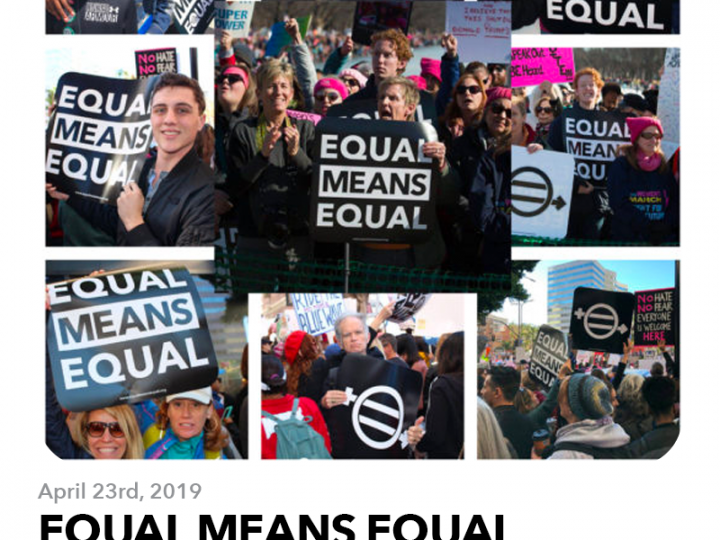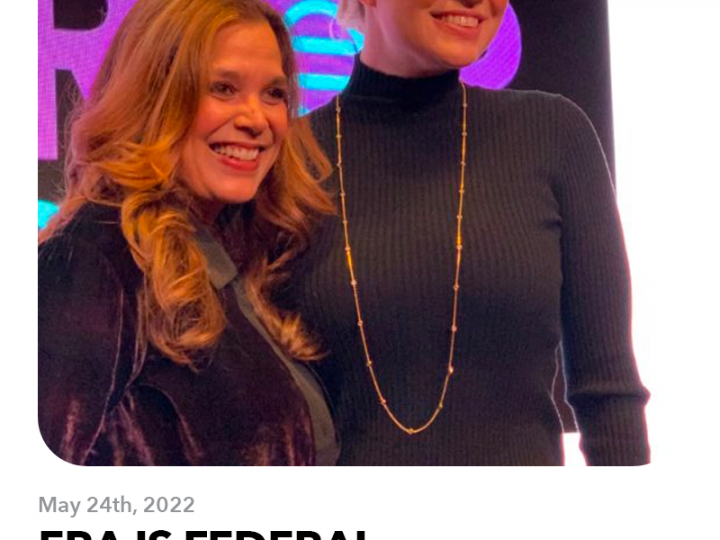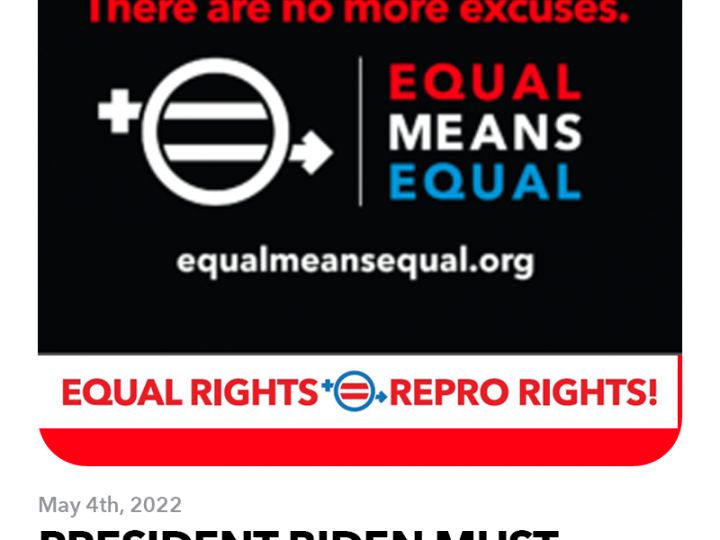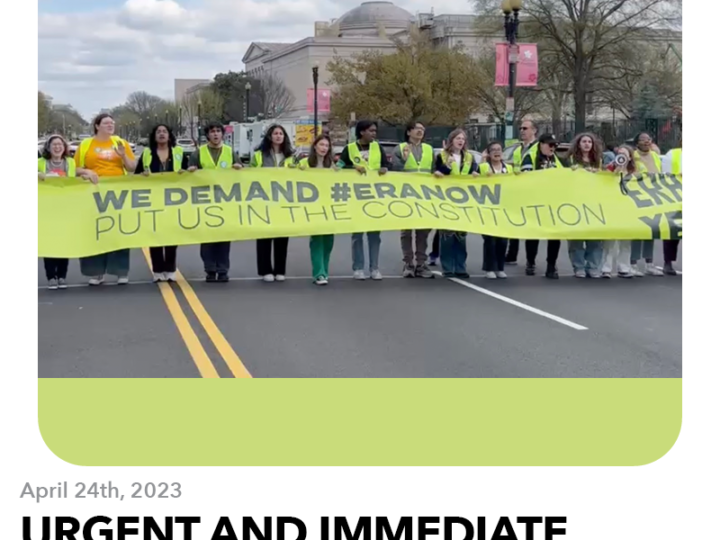As the battle for completing the Equal Rights Amendment and finally bringing 162+ M Americans equal rights and protections under law heats up, the forces against us are increasing in pressure and power.
We want you to be aware of a recent situation here in Virginia that urgently needs public awareness. Please share this information from our partners at VARatifyERA.org however you can.
Jess Foster, democratic candidate for the 88th House District, and her republican opponent, Mark Cole, appeared before a crowd of about 150 people on the University of Mary Washington campus for a spirited debate on the issues.
At that time, Cole’s campaign circulated a flyer titled “The Truth about the Equal Rights Amendment Ratification.” The flyer was circulated after the candidates were positioned to begin the debate, so Foster was unable to read it or respond to the misinformation contained therein. Her response follows.
The ERA Resolution that passed the Senate this year by a vote of 26 to 14 (with 7 Republicans supporting it) was sent to the House’s Privileges and Elections Committee for consideration. Ratification of a Constitutional Amendment requires the approval of the entire state legislature, not of just one chamber. Much like every year before, the ERA died in a 7:00 a.m. committee meeting that was placed on the calendar with less than 24 hours notice to the public. The scheduling was intentional and the fate of the resolution was predetermined by the GOP. Nonetheless, ERA advocates were able to organize and attend the committee meeting, including Foster, but they were not allowed to speak. The resolution failed to pass because the following Delegates voted to kill the Resolution: Ransone, Ingram, Fowler, and McGuire – all Republicans. Whatever their excuse, they made the decision to prevent the ERA Resolution from going to the full House for a vote. They bypassed the will of Virginians, who overwhelmingly support the ERA. All subsequent motions to revive the ERA died on party lines.
Cole’s flyer is a clear misrepresentation of several important facts regarding the ERA. As his constituent, Foster takes offense at the intentional misrepresentations made for the sake of political gain.
Starting from the top with a bit of history: gender equality is not a constitutional right even though many believe that it already is. Courts have recognized equal protection claims under the Fifth and Fourteenth Amendments, but claims on the basis of sex discrimination are subjected to a more lenient test that makes it easier for the government to discriminate on the basis of sex than on the basis of race. If, as Cole claims, the Fourteenth Amendment gives women a “full claim to equal rights,” then why did we need to ratify the Nineteenth Amendment guaranteeing women the right to vote?
In order to make gender equality a constitutional right, we must change our U.S. Constitution to include it, much like we had to do to specifically allow women to vote. To change the Constitution, the Amendment has to pass Congress first. Then it goes to the states where 38 states must agree by passing the Amendment in their state legislatures. Foster says, “Cole’s use of the deadline is just an invalidated and unfounded excuse to block gender equality.” Here’s why:
1. The U.S. Constitution says nothing about restricting states’ power to ratify. According to the Constitution, Article V, once a proposed amendment has been ratified by three-fourths of the states (now 38 states), it “shall be valid to all intents and purposes, as part of this Constitution.” The Founders carefully separated the power of Congress (to propose amendments) from the power of the states (to ratify amendments and to propose amendments through a constitutional convention). Cole, who is not a lawyer, gives no reason for departing from the words of the Constitution. Instead of taking our Founders at their word, Cole prefers to give more power to Congress in the amendment process — at the expense of the states. If nothing else, this is a states’ rights issue. That’s why the “deadline excuse” did not prevent Nevada or Illinois from ratifying just recently.
2. Congress did not include its deadline in the text of the proposed Equal Rights Amendment. Rather, Congress included the deadline in the language proposing the amendment. This is an important difference because in all cases recognizing the validity of a Congressional deadline, the deadline was included in the amendment itself, which had been approved by the states. For a court to invalidate deadlines included in the amendment, it would have to invalidate not only Congress’s action but also the approvals of all the ratifying states. Rejecting a deadline approved by the states would wrongfully deprive the states of their power in the ratification process. Rejecting a deadline imposed only by Congress does not deprive states of their power.
3. In addition, Cole conveniently leaves out a formal Attorney General Opinion 1 wherein the lead attorney for the Commonwealth specifically states that “the lapse of the ERA’s original and extended ratification periods has not disempowered the General Assembly from passing a ratifying resolution.” Instead, Cole refers to a “1994 Attorney General opinion.” No such opinion actually exists. And if he disagrees, Foster challenges her opponent to produce this opinion.
4. What about the five states that have rescinded their ratification? That’s not authorized by our U.S. Constitution. Once a state has ratified, there’s no backing out. Article V of the Constitution grants only ratification power. Once a state 2 legislative body has ratified an amendment pursuant to Article V, its constitutional role is complete. 3
1. Attempts at rescission have been ineffective. Ohio and New Jersey tried to back out of their ratifications of the 14th Amendment and failed. In 1920, 4 West Virginia tried to rescind its rescission of the 19th amendment (women’s right to vote), the Secretary of State ignored the attempt and certified the amendment.
5. Cole’s characterization of NOW v. Idaho, 459 U.S. 809 (1982) is an egregious misrepresentation of case law. In that case, the Court did not rule one way or the other on whether “the ERA had expired,” as Cole claims. By the time the case reached the Supreme Court, there was no live case or controversy between the parties. The Acting Solicitor General had advised the Court that the case was moot because the Equal Rights Amendment had not been ratified by three-fourths of the states. The U.S. Supreme Court cannot and will not issue an advisory opinion so no decision was issued. Again, Foster challenges her opponent to actually produce the case he claims is decisive on the deadline issue.
Cole’s position with respect to the ERA is, at best, misinformed, and at worst, intentionally misleading. Despite having the legal and factual information, he chooses to disregard scholarly articles that refer to actual cases and real law.
The Equal Rights Amendment simply says, “Equality of rights under the law shall not be denied or abridged by the United States or by any State on account of sex.” Cole says this language is “very broad and allow[s] no exceptions.” As everyone knows, the language of the Bill of Rights is broad and does not always contain exceptions to its broad prohibitions. For example, the First Amendment prohibits the government from passing any law that abridges speech, but we all know that certain speech (e.g., yelling fire in a crowded theater) is not protected.
Furthermore, Cole expresses a number of concerns regarding unintended consequences like separate bathrooms and showers. Virginia’s Constitution has its own Equal Rights Amendment and none of these unintended consequences have come to bear. A white paper with no sources can hardly be trusted.
Why has the Virginia GOP made the ERA such a huge partisan issue? Most Virginians favor gender equality. Lawmakers across the country support the amendment, Democrats and Republicans alike. What’s the hold up Virginia? Foster feels that if Cole truly believed in equality, “he would not be making up lies and excuses to avoid ratification of the ERA.” Foster is committed to equality across the board and hopes to unseat the anti-equality incumbent on November 5, 2019.
Reference:
Opinion Letter of Mark Herring, Attorney General of the Commonwealth of Virginia, May 11, 2018. 1
Walter Dellinger, The Legitimacy of Constitutional Change: Rethinking the Amendment Process, 97 Harv. L. 2Rev. 386, 419-20 (1983).
Id. 3 W.F. Dodd, Amending the Federal Constitution, 30 Yale L.J. 321, 346 (1921). 4
We are here in the thick of things and hope you will come or give some of your time and energy to making history happen.
Thanks and love,
Kamala, Natalie and the EME Team




